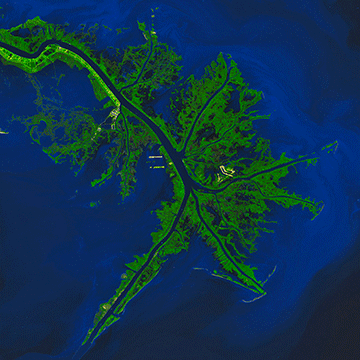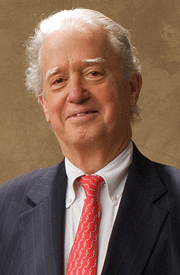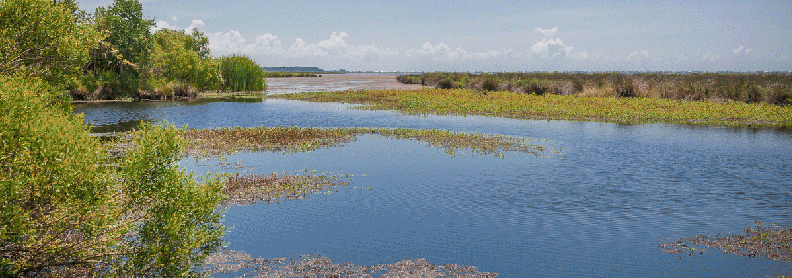
Photo by Kendrick Disch
Louisianans refer to the three splayed-out channels of the southernmost Mississippi River as "the bird foot" because that's what it looks like on a map.
For now, anyway. But to stay accurate, the map of the Mississippi River Delta must constantly change. The wetlands that flank the river have inexorably shriveled over the past 85 years. Levees built along the Mississippi have confined the water, so the river can't naturally overflow its banks and deposit the sediments that over centuries formed the wetlands. Other forces, including rising sea levels and canals sliced through marshes for energy production, have also contributed to coastal wetlands loss.

Coastal erosion continues at an alarming rate. As saltwater encroaches, Louisiana is losing the equivalent of a football field of land every hour, according to the America's Wetland Foundation.
Hurricane Katrina and the 2010 Gulf of Mexico oil spill thrust into public consciousness the catastrophe that could unfold if Louisiana's coast keeps collapsing. New Orleans itself would be at risk.
The good news is people are fighting back. It'll be a long, enormously expensive fight—costing at least $50 billion, by conservative estimates. And it's still unclear whether sufficient resources will be available to fight effectively and where the money will come from. (Some funding will come from a settlement with BP, announced after this interview was conducted, that is expected to net the state of Louisiana nearly $7 billion.)

R. King Milling
On these matters, R. King Milling offers an uncommon perspective. A lifelong New Orleanian, Milling speaks with an accent that virtually transports a listener to the oak-lined boulevards of Uptown. His rich business and civic experience informs a multifaceted view of the ecology and economics of his native state's vital but beleaguered river and coastline. Milling—a former member of the board of the New Orleans Branch of the Atlanta Fed—recently spoke with Economy Matters staff writer Charles Davidson. Here are excerpts of that conversation.
Charles Davidson: From an economic standpoint, why is wetlands loss an important issue?
King Milling: The delta has always been the basis of the economy of this area. The Spanish and the French wanted to come to New Orleans because they recognized it as the pathway to the central part of what we now call the United States. That river was the financial engine, if you will, that has created much of the wealth in the central part of this United States. If the river, for example, for one day is shut down, I think it costs the country in the neighborhood of $470 million, and it escalates each day thereafter.
Now, what is the relationship between the ecosystem of the delta itself and the river? Long before the levee system was put in place, but even more so afterward, what kept the river safe was the ability of this massive ecosystem down here, composed of marsh and swamp and forest, to diminish the power of storms and surges. Without that massive ecosystem—which is disappearing—that levee system becomes at risk.
The other issues are that 30 percent by weight of fish consumed in this country is also at risk. About 95 percent of the oil and gas produced offshore goes right through this ecosystem. All that becomes at risk.
We could end up having to move in excess of a million people. And the infrastructure attached to that—cities, water systems, highways, and railroads—will ultimately be remarkably expensive. When you add it all together, you're looking at something that not only impacts this country and this region and this state and the local citizens, but something that has truly global-type expectations and impacts. The cost factor is unbelievable.

Photo by Kendrick Disch
Listen to King Milling discuss the Louisiana wetlands in a brief except from this interview.
CD: It's easy to get depressed about this. But are there reasons for hope?
KM: Is there something that can be done? Yes. It took us a while to get there because over the first number of years nobody—except for a few—knew what the hell was happening. And then I think it began to be recognized as a problem, the massiveness of which has probably escalated over the years.
No matter what we do and how much we wish people had thought it through earlier, we're in a position where we are only now widely recognizing the scope of the problem. About 20 years ago, we were putting about $80 million a year into incremental restoration jobs. But it became apparent to many people that we were still losing 25 to 35 square miles a year.
The fundamental truth is that groups working to restore the coast have to prioritize activity, and it's a long-term program. It's a 50-year, $50 billion program. I think the next update of Louisiana's Comprehensive Master Plan for a Sustainable Coast is going to call for a 70-year, $70 billion program.
CD: Do you feel good about the progress that's being made?
KM: I do. I think that people get very frustrated; they want action now. But there are things that are being done now. For example, the CPRA [the Coastal Protection and Restoration Authority of Louisiana] is working with the groups funded in large measure by the National Fish and Wildlife Foundation, which are rebuilding the barrier islands. That project is being done now at a considerable cost. It's anticipated that if all this goes as we wish, we'll probably begin to see the construction of new diversions of river water into coastal wetlands to rebuild land in 2017 and 2018.
Do I wish it were moving faster? Yes. But the consequences of moving too fast could be a disaster. So a lot of this is focused on this issue of making sure that we've got the right group involved.
CD: This is all incredibly expensive. Is there going to be enough money to do a lot of this work over time?
KM: Of course—but that's easy for me to say. Will it be a challenge? Absolutely. The real issue is coming up with sources of funds. I think it's estimated that the state of Louisiana could realistically spend...about a billion dollars a year.
If you make it too much more than this amount, regardless of whether it's the state or another entity providing the funds, you're creating too much pressure. So you've got to keep control over the expenditures. Even when you look at it from that standpoint—a billion a year—it's still not insignificant.
The BP spill settlement is not going to be an insignificant sum of money in the short term. The National Fish and Wildlife Foundation has already gotten $2.4 billion—maybe more than that, actually—to distribute among Louisiana, Texas, Mississippi, Alabama, and Florida for some of the BP damages. That money's being used right now for the design of these diversions. Some of the money at the end of the day will probably be used for the establishment of at least one diversion, and there are probably three or four more to come.
You've really got to look at what the cost will be if we don't do it.
CD: What's the best we can hope for? It is realistic to think we can get the delta back to where it was in the early 20th century?
KM: Absolutely not. That's long since gone. All of these issues we are talking about now are compounded by the fact that there is increased sea level. In south Louisiana, I think we recognize that we can never go back and recreate the coastline as of 1927 or '30, so there's going to be portions that will be lost. Do we know the absolute limit on what that is today? No. But we do know that if we don't do what we need to do today, the ongoing losses are going to be phenomenal.
CD: What can ordinary people do to help?
KM: There are a number of 501(c)(3)s that have been very active in trying to elevate the exposure of this problem to the citizens of this country. And just funding them would be helpful. The truth of it is every dollar is important.
We—the 501(c)(3) I've been working with—have gone to Chicago, Minneapolis, and all the way up and down the Mississippi saying, this is a problem for you as well as us. We take this river for granted. It's always been there. You go out and look at it and say, "Who could mess with that?" But it can be messed with.
Read the Economy Matters feature on New Orleans 10 years after Hurricane Katrina.




